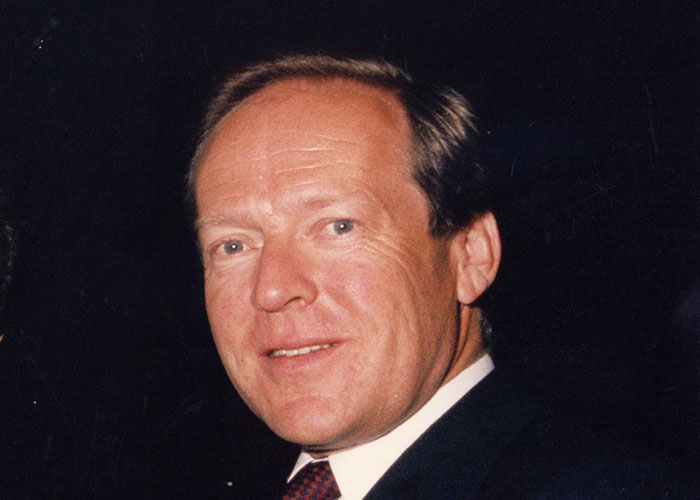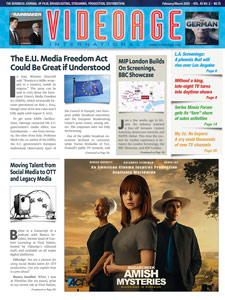It can be said that vertical integration in the U.S. television industry began in 1993 with the repeal of the so-called Fin-Syn rule, which was established in 1970.
In fact, 1970 was the year in which Herbert Georg Kloiber (generally known as Dr. Kloiber) entered the German entertainment sector and, with hindsight, it could be said the seed of vertical integration was already ingrained in his mind.
Kloiber made his first appearance in the international television distribution business at MIP-TV 1970, when he was 23 years old. In effect, he’s the youngest of the world’s international TV distribution pioneers, yet still one of the oldest MIP-TV participants.
German pioneer TV producer and distributor Reiner Moritz recounts how the proprietor of Tele München Gruppe (TMG), one of Germany’s largest media holdings, ended up owning a vertically integrated TV production, distribution and broadcasting business: “Late in the 1960s at the Palace Hotel in Montreux during the Rose d´Or Festival, I made a bet with David Attenborough that he would step down as controller of BBC-2 when I had my PhD and I would quit the Kirch Group, which I did in 1969 as he had simultaneously done at the BBC. Since a successor for me was needed at Kirch Group, Herbert von Karajan, with whom Leo Kirch jointly owned the Swiss production company Cosmotel, mentioned to both me and Leo a young aspiring Herbert Kloiber, his godson.”
In 1970, the same year that Kloiber received his law degree from the University of Vienna — his birthplace — he started at Beta-Taurus, the combined company that Leo Kirch had founded in 1959 as Beta Film, and Taurus Film in 1963. Four years later Kloiber was named managing director of Unitel, a producer and distributor of classical music founded by Kirch in 1959.
But let’s return to Moritz’s recollections: “Herbert comes from an old well-to-do Viennese family. His father, an industrialist, held two PhDs and died in 1987, while working on his third, which dealt with French and Catalan influence on the language of the inhabitants of Mallorca. His mother, who recently died at the age of 99, hosted a salon where famous people met. She disliked the idea of seeing her eldest son go into the ‘film business’, which she associated with the red light district. She therefore bore a grudge against me for a long time.”
In 1976 Kloiber left Beta and founded Clasart, a company based in Munich. “He fell out with Kirch for artistic reasons,” explained Moritz.
That was the also the year Kloiber became interested in building a vertically integrated company, and he credits a “meeting with a public TV executive.”
Clasart was the springboard for his vertical integration ambitions. Even though Andrew Carnegie basically invented vertical integration in 1892 with his steel company in the U.S., for the entertainment business the strategy was first applied in Europe in 1909. That was the year when Pathé Frères controlled both film production and distribution in France and Belgium. Then, 67 years later, Kloiber brought the concept to Germany’s entertainment sector.
In 1977, he acquired Tele München with filmmaker Fritz Buttenstedt who, reported Kloiber, remained a partner “only for a few early years.” Tele München was then a seven-year-old production company founded by producer Walter Ulbrich. Some 38 years later, TMG’s revenues for 2015 (as described in a release last July) were 236 million euro with a 24 percent profit margin: Revenues from theatrical distribution (Concorde Filmverleih) were lower than 2014, but Concorde Home Entertainment achieved good results. In broadcasting Tele 5 and RTL 2 maintained their market share and boosted their income; Clasart Classic generated another growth in revenue with Met im Kino, live broadcasts from the New York Metropolitan Opera, with 188 participating theaters in Germany and Austria. Not taken into account in EBITDA were the investments in the television broadcasters RTL 2 and ATV, as well as the holding in Odeon Film AG.
“I liked Herbert and decided to take him around the world to introduce him properly to all our clients,” Moritz continued. “At his first MIP-TV our task was to sell the recent Herbert von Karajan’s Cosmotel productions, all shot on 35mm film. As no cassettes or DVDs existed at the time we had to hire a cinema on Rue d´Antibes hoping that clients weren’t too drunk from the night before to turn up. Karajan would recompense those who did show for a screening with an outing on his sailing boat,” he said.
Tele München entered the TV broadcasting arena in 1986 as the fourth largest shareholder with 6.8 percent of SAT1, Germany’s first private TV broadcaster. Those shares were sold the following year. Also in 1986, Kloiber purchased KMP, which owned and operated TV broadcaster Musicbox. “This was the only time I risked the whole company,” he said, looking back on it. “There was a point with Musicbox where we only had cash for a few months of operation.”
Then, from the mid-1980s up until 2004, TMG went through more than 20 transactions, buying and selling into 15 companies.
In 1987 he sold 50 percent of Musicbox to Italy’s Silvio Berlusconi who, a year later, turned it into Tele5. Subsequently, Tele5 became sport channel DSF when Leo Kirch acquired it in 1992. However, TMG kept the Tele5 name and used it to relaunch the channel in 2002.
In 1987 Capital City/ABC acquired a 50 percent stake in TMG, shares that Kloiber re-acquired nine years later, when Disney bought CAP Cities. About that period, Kloiber acknowledged it by saying, “ABC was the best partnership I’ve ever had. We didn’t argue for five minutes. I learned more in the nine years with Capital than I did in the 20 years in business beforehand.”
In 1992, together with CLT, Bertelsmann and Bauer, TMG founded the broadcast network RTL 2. Today, TMG together with Disney (through a joint venture) holds 31.5 percent of RTL 2.
In 1995, Kloiber and Heinz Bauer established TV network tm3 in Munich. A year later, Kloiber bought out Bauer, but subsequently, in 1998 he sold the first 66 percent of tm3 to Rupert Murdoch, and two years later the remaining shares for U.S.$170 million. Then Murdoch sold tm3 to the Kirch Group. Kloiber explained that tm3 was renamed 9 live and went on to become a quiz/call-in format station and that it later belonged to ProSiebenSat1.
In 1997, TMG acquired TV2 Hungary, which was exchanged for shares in Scandinavian broadcaster SBS in 1999, shares which then sold in 2005 when Pro7 acquired SBS.
In 1999, he sold 45 percent of TMG to the Munich-based EM.TV for the equivalent of U.S.$450 million in cash. When in 2001 the EM.TV stock went from 120 euro to penny stock status, Kloiber was able to buy back the stake for just $109 million.
Just between the years 1999 and 2004, Kloiber went through nine major transactions, including acquiring in 1999 a 40 percent stake in ATV, Austria’s first private broadcaster, and in 2000 shares in Lionsgate, which were sold three years later.
In addition to the aforementioned companies, TMG holds a 50 percent stake in On Demand Deutschland, a VoD joint venture with the London-based Vubiquity.
In 2008, TMG set up its own world sales operation: TM International, which buys international rights, handing German-speaking territories over to parent company TMG and selling off the rest.
Kloiber can hold any negotiations in perfect English, French or Italian, in addition to his native German. For example, with this journalist he prefers conversing in Italian as does his 40- year-old son Herbert Leopold, who’s married to an Italian from Venice and who in 2012 was appointed TMG’s managing director.
As the senior Kloiber explained, his Italian comes from childhood summer visits to Venice starting in 1950, and French from the Swiss boarding school he attended near Geneva from 1957 to 1965.
Many MIP-TV and MIPCOM participants are aware that during the Cannes markets, even though he has a stand in the Palais, Kloiber prefers conducting business meetings on a boat. This journalist embarrassingly discovered that the big vessel was Kloiber’s own when, invited on the boat, he asked him to remove his shoes, something that’s not likely to be requested if the boat is rented. Thus, this reporter learned that Kloiber is also an avid sailor and that he moors his boat in Monte Carlo from where he sails it to Cannes. But, how did he learn how to sail, having grown up in a country that is landlocked? “On an Austrian lake,” explained Kloiber, then he expanded: “Austria has many Olympic sailing medals.”
Among the few questions that he preferred not to answer for this feature was the strategy behind the multiple buying and selling operations from 1987 to 2004, and what his main early challenges were, and what they are now. However, he provided an amusing reply when asked if he likes to delegate, “Not really…. they say,” he said.
Commented a German TV executive, who also speaks Italian: “I had little dealings with Kloiber, but I know that he can be a charming person, but when he gets mad, you better watch out!” Kloiber is also very sticky with his name, recalled pioneer U.S. TV distributor Sandy Frank: “When I called him ‘Herb,’ be sternly told me that his name was Herbert.”
Thus, it is only appropriate that Kloiber has the last word. When asked what legacy he hopes to leave to the German entertainment industry, he concluded: “A feel for top quality.”
(By Dom Serafini)
Audio Version (a DV Works service)












Leave A Comment